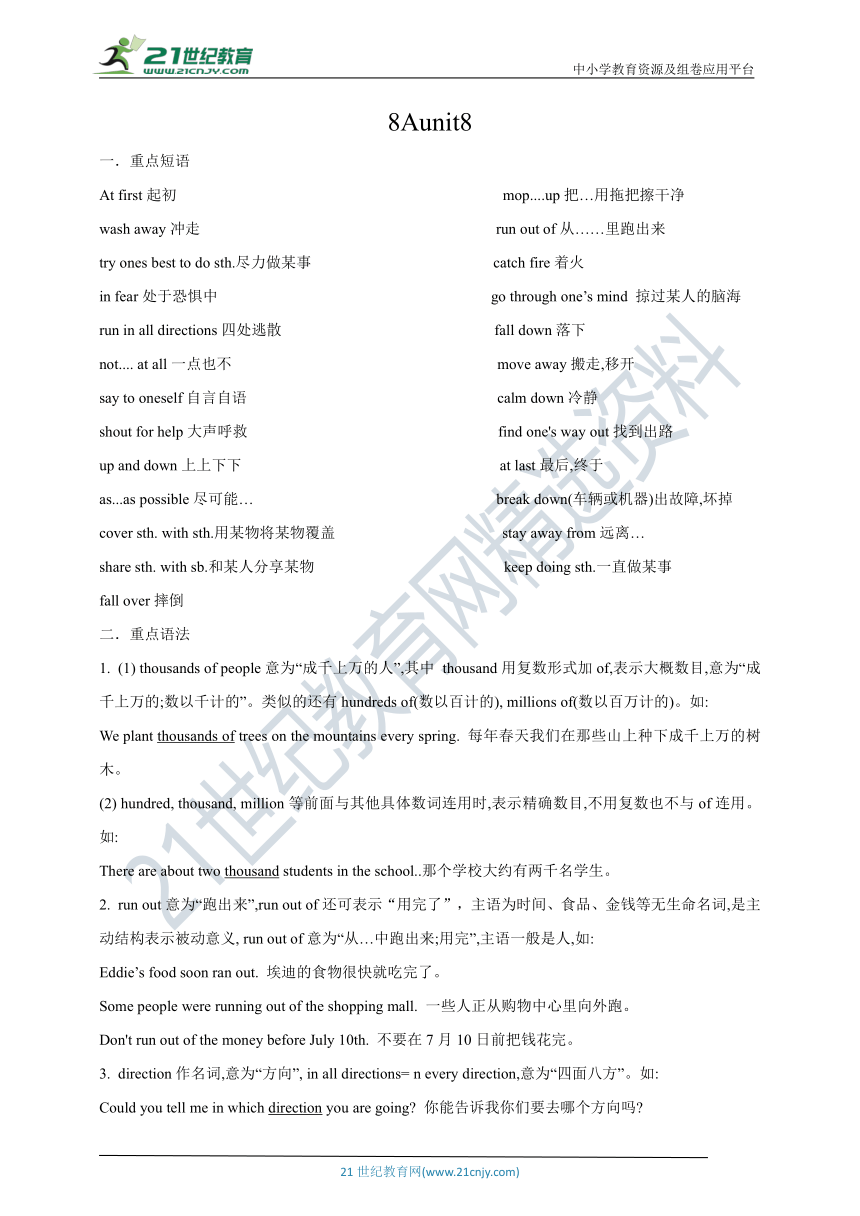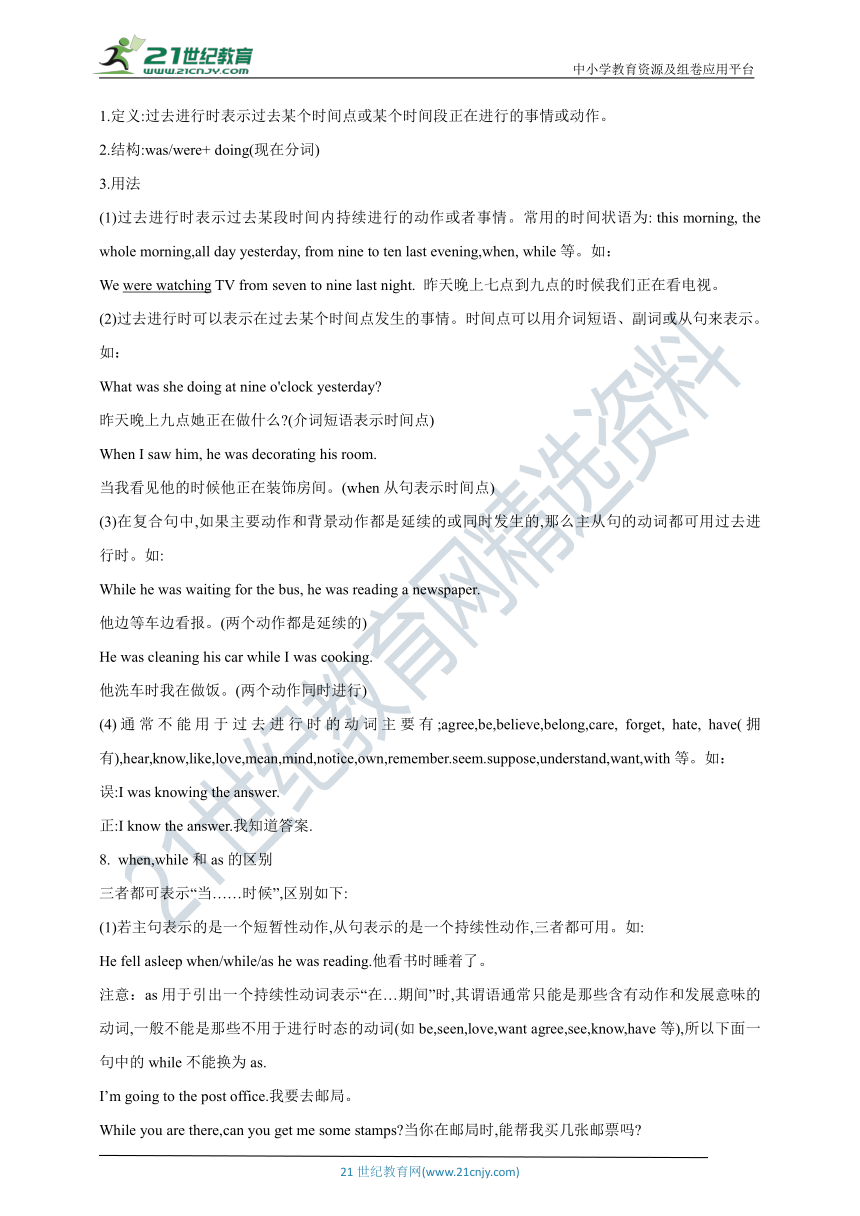Unit 8 Natural disasters 期末复习学案 (重难点精讲+巩固练习+答案)
文档属性
| 名称 | Unit 8 Natural disasters 期末复习学案 (重难点精讲+巩固练习+答案) |  | |
| 格式 | zip | ||
| 文件大小 | 1.2MB | ||
| 资源类型 | 试卷 | ||
| 版本资源 | 牛津译林版 | ||
| 科目 | 英语 | ||
| 更新时间 | 2021-01-25 14:56:55 | ||
图片预览




文档简介
中小学教育资源及组卷应用平台
8Aunit8
重点短语
At
first起初
mop....up把…用拖把擦干净
wash
away冲走
run
out
of从……里跑出来
try
ones
best
to
do
sth.尽力做某事
catch
fire着火
in
fear处于恐惧中
go
through
one’s
mind
掠过某人的脑海
run
in
all
directions四处逃散
fall
down落下
not....
at
all一点也不
move
away搬走,移开
say
to
oneself自言自语
calm
down冷静
shout
for
help大声呼救
find
one's
way
out找到出路
up
and
down上上下下
at
last最后,终于
as...as
possible尽可能…
break
down(车辆或机器)出故障,坏掉
cover
sth.
with
sth.用某物将某物覆盖
stay
away
from远离…
share
sth.
with
sb.和某人分享某物
keep
doing
sth.一直做某事
fall
over摔倒
二.重点语法
(1)
thousands
of
people意为“成千上万的人”,其中
thousand用复数形式加of,表示大概数目,意为“成千上万的;数以千计的”。类似的还有hundreds
of(数以百计的),
millions
of(数以百万计的)。如:
We
plant
thousands
of
trees
on
the
mountains
every
spring.
每年春天我们在那些山上种下成千上万的树木。
(2)
hundred,
thousand,
million等前面与其他具体数词连用时,表示精确数目,不用复数也不与of连用。如:
There
are
about
two
thousand
students
in
the
school..那个学校大约有两千名学生。
run
out意为“跑出来”,run
out
of还可表示“用完了”,主语为时间、食品、金钱等无生命名词,是主动结构表示被动意义,
run
out
of意为“从…中跑出来;用完”,主语一般是人,如:
Eddie’s
food
soon
ran
out.
埃迪的食物很快就吃完了。
Some
people
were
running
out
of
the
shopping
mall.
一些人正从购物中心里向外跑。
Don't
run
out
of
the
money
before
July
10th.
不要在7月10日前把钱花完。
direction作名词,意为“方向”,
in
all
directions=
n
every
direction,意为“四面八方”。如:
Could
you
tell
me
in
which
direction
you
are
going?
你能告诉我你们要去哪个方向吗?
The
sheep
ran
in
all
directions.
羊群向四面八方跑去。
direction作名词,还可意为“指示;说明”。如:
Your
mother's
advice
is
right.
You
should
follow
her
directions.
你妈妈的建议是对的。你应当按她的指示去做。
fall
down意为“跌倒;落下”,如:
Babies
often
fall
down
when
they
learn
to
walk.
婴儿在学走路时经常摔倒。
(辨析)
fall
down,fall
of与fall
over
①
fall
down意为“跌倒;落下”,后面接宾语时要加介词from.
The
boy
fell
down
from
the
bike
and
hurt
his
left
leg.
这个男孩从自行车上摔了下来,伤了左腿。
②
fall
off意为“跌落;从…掉下来”,后面可直接接宾语。
The
man
fell
off
the
horse.
这个人从马上跌了下来。
③
fall
over意为“向前摔倒;跌倒”,后面不加宾语。
I
saw
the
little
boy
fall
over
and
hurt
his
head.
我看见这个小男孩摔倒了,伤了头。
beat作动词,意为“(心脏)跳动”,如:
He
is
alive
-
his
heart
is
still
beating.
他还活着一他的心脏仍在跳动
beat作动词,还可表示“打败,击败”的意思。如:
Our
basketball
team
beat
theirs
easily.
我们的篮球队轻松地击败了他们的篮球队。
since作连词,意为“因为;既然”。如:
Since
he
was
busy,
he
didn’
t
come.他因为忙,所以没有来。
辨析:since,as与
because
三个词都表示“因为”,引导原因状语从句。
①
since表示双方都知道的原因或不如句子的其余部分重要,意为“既然”,常位于句首,不能回答why的问句,如:
Since
everyone
is
here,let'
s
begin
our
meeting.
既然大家都来了,我们就开始开会吧。
②as引导的从句多置于句首,表示十分明显的原因,意为“由于;鉴于”,不如
since正式,不能回答why的问句。如:
As
you
were
not
there,
I
left
a
message.
由于你不在,我就留了个口信。
③
because引导的从句常位于句末,表示直接的原因或理由,表示必然性,常用于回答why引导的问句。如:
I
was
late
because
I
was
ill
yesterday.
昨天我迟到了,因为我生病了。
语法:过去进行时
1.定义:过去进行时表示过去某个时间点或某个时间段正在进行的事情或动作。
2.结构:was/were+
doing(现在分词)
3.用法
(1)过去进行时表示过去某段时间内持续进行的动作或者事情。常用的时间状语为:
this
morning,
the
whole
morning,all
day
yesterday,
from
nine
to
ten
last
evening,when,
while等。如:
We
were
watching
TV
from
seven
to
nine
last
night.
昨天晚上七点到九点的时候我们正在看电视。
(2)过去进行时可以表示在过去某个时间点发生的事情。时间点可以用介词短语、副词或从句来表示。如:
What
was
she
doing
at
nine
o'clock
yesterday?
昨天晚上九点她正在做什么?(介词短语表示时间点)
When
I
saw
him,
he
was
decorating
his
room.
当我看见他的时候他正在装饰房间。(when从句表示时间点)
(3)在复合句中,如果主要动作和背景动作都是延续的或同时发生的,那么主从句的动词都可用过去进行时。如:
While
he
was
waiting
for
the
bus,
he
was
reading
a
newspaper.
他边等车边看报。(两个动作都是延续的)
He
was
cleaning
his
car
while
I
was
cooking.
他洗车时我在做饭。(两个动作同时进行)
(4)通常不能用于过去进行时的动词主要有;agree,be,believe,belong,care,
forget,
hate,
have(拥有),hear,know,like,love,mean,mind,notice,own,remember.seem.suppose,understand,want,with等。如:
误:I
was
knowing
the
answer.
正:I
know
the
answer.我知道答案.
when,while和as的区别
三者都可表示“当……时候”,区别如下:
(1)若主句表示的是一个短暂性动作,从句表示的是一个持续性动作,三者都可用。如:
He
fell
asleep
when/while/as
he
was
reading.他看书时睡着了。
注意:as用于引出一个持续性动词表示“在…期间”时,其谓语通常只能是那些含有动作和发展意味的动词,一般不能是那些不用于进行时态的动词(如be,seen,love,want
agree,see,know,have等),所以下面一句中的while不能换为as.
I’m
going
to
the
post
office.我要去邮局。
While
you
are
there,can
you
get
me
some
stamps?当你在邮局时,能帮我买几张邮票吗?
(2)若主从句表示两个同时进行的持续性动作,且强调主句表示的动作延续到从句所指的整个时间,通常要用while,
如:
I
kept
silent
while
he
was
writing.
在他写作的时候,我默不作声。
但是,若主从句表示的是两个同时进行的动作且含有“一边........一边.......”之意时,通常用as。如:
She
sang
as
she
went
along.
她边走边唱。
(3)若从句是一个短暂性动作,主句是一个持续性动作,可用as/when,但不用
while,如:
It
was
raining
hard
when/
as
we
arrived.
我们到达时正下着大雨。
(4)若主从句表示的是两个同时(或几乎同时)发生的短暂性动作,用as/when。如:
I
thought
of
it
just
when/as
you
opened
your
mouth.
就在你要说的时候,我也想到了。
(5)若要表示两个正在发展变化的情况,相当于汉语的“随着”,一般用as.如:
Things
are
getting
better
and
better
as
time
goes
on.
随着时间的推移,情况变得越来越好。
表示“每当…的时候”(暗示一种规律性),一般要用when,如:
He
smiles
when
you
praise
him.
你夸奖他时他总是微笑。
(7)若主从句所表示的动作不是同时发生,而是有先后顺序时,一般要用when。如:
I
will
go
home
when
he
comes
back.
他回来时,我就回家去。
(8)when可用作并列连词,表示“这时(突然)”;
while也可以用作并列连词,表示“而,却”(表示对比);但as则没有类似用法。如:
We
were
about
to
start
when
it
began
to
rain.
我们正要出发,这时天开始下雨了
He
likes
coffee,
while
she
likes
tea.
他喜欢咖啡,而她却喜欢茶。
(9)as和when后均可直接跟一个名词,构成省略句,但while一般不这样用。如:
As/
When
a
boy,
he
lived
in
Japan.
他小时候住在日本。
when和
while后可接现在分词、介词短语、形容词等构成省略句,但as一般不这样用。如:
when/
While
in
trouble,
ask
her
for
help遇到麻烦的时候你就去找她帮忙。
what
to
do意为“做什么”,属于“特殊疑问词+动词不定式”结构,相当于名词,可以作主语、表语或宾语。要注意特殊疑问词与不定式之间的句法关系:通常疑问代词充当不定式动作的宾语或逻辑主语,疑问副词充当不定式动作的状语。如:
Where
to
hold
the
meeting
is
still
a
problem.
在哪儿开会还是个问题。(“特殊疑问词十动词不定式”结构作主语,疑问副词
where作不定式的状语)
We
can't
decide
who
to
speak.
我们不能决定由谁发言。(“特殊疑问词十动词不定式”结构作宾语,疑问代词who作不定式的逻辑主语)
cover作动词,意为“覆盖;涉及,包括”,
cover.with,意为“用……盖住……”。如
You
can
cover
the
box
with
a
piece
of
paper.
你可以用一张纸盖在盒子上。
cover作名词,意为“(书)封面”。如:
Is
that
you
on
the
cover?
那个封面人物是你吗?
burn作动词时,意为“烧毁;烧伤,烫伤”,如:
The
house
was
burnt
to
the
ground.
这所房子已烧为灰烬。
burn作名词时,意为“烧伤;烧痕”。如:
You
can
get
a
burn
if
you
are
not
careful.
如果你不小心,你可能会留下烧痕。
练习:
一.单选
1.
It’s
today.You’d
better
to
the
museum.
A.raining;go
B.rainy;not
go
C.raining;not
to
go
D.rainy;not
to
go
2.
It
is
hotter
today
than
it
was
yesterday.
A.too
B.very
C.much
D.little
3.They
looked
each
other
after
the
traffic
accident
happened.
A.fear
B.fears
C.in
fear
D.in
fears
4.
graduation
from
school,he
found
a
job
in
another
city.
A.While
B.When
C.As
D.After
5.
While
she
TV,she
a
sound
outside
the
room.
A.was
watching;was
hearing
B.watched;was
hearing
C.watched;heard
D.was
watching;heard
6.He
said
he
to
draw
a
plane
on
the
blackboard
at
that
time.
A.tries
B.tried
C.was
trying
D.will
try
7.
What
do
giant
pandas
the
wild?
A.
live
on
B.
live
in
C.
live
on
in
D.
live
by
in
8.
Do
you
believe
that
a
baby
panda
drinks
his
mother’s
milk
for
14
hours
a
day?
A.
up
for
B.
for
up
C.
up
to
D.to
up
9.
Taiwan
is
the
east
of
China
and
the
east
of
Fujian.
A.
in;
in
B.in;
to
C.to;
on
D.
to;
to
10.
—How
far
is
the
journey?
—
.
Five
minutes’
ride
B.
Just
five
minutes
C.
Three
times
a
week
D.
Three
thousands
of
miles
11.—A
new
car
factory
will
be
built
here.
—I’m
glad
to
hear
that.
It’ll
young
people
work.
A.
provide;
with
B.
provide;
to
C.
provide;
for
D.
give;
with
12.
—Can
I
have
my
car
here?
—No,
there
at
all.
are
not
any
rooms
B.is
not
a
space
C.is
no
space
D.
are
no
spaces
动词填空
Help
(you)
to
some
tomatoes,children.They
(taste)
nice.
—Who
do
you
think
(sing)
in
the
next
room?
—Maybe
Amy
is.
you
(mop)
the
floor
at
that
time
yesterday
evening.
He
(repair)
his
bike
when
I
saw
him
yesterday
afternoon.
When
we
(do)
some
shopping
in
the
supermarket,the
light
went
out.
The
reporter
(record)
the
information
when
the
car
accident
happened.
I’m
too
tired.
Let’s
(stop)
(have)
a
rest.
We
should
do
what
we
can
(protect)wild
animals.
9.“Boys
and
girls,
please
write
down
your
(address)
on
this
piece
of
paper,”
the
teacher
said.
10.Many
people
cut
down
many
trees
(make)
more
money.
答案:
一.1-5BCCDD;6-10CCCAA;11-12AC
二.1.yourselves;taste,2.is
singing,3.Were
mopping.4.was
repairing,5.were
doing,6.was
recording.7.stop
to
8.to
protect
9.addresses
10.to
make
21世纪教育网
www.21cnjy.com
精品试卷·第
2
页
(共
2
页)
HYPERLINK
"http://21世纪教育网(www.21cnjy.com)
"
21世纪教育网(www.21cnjy.com)
8Aunit8
重点短语
At
first起初
mop....up把…用拖把擦干净
wash
away冲走
run
out
of从……里跑出来
try
ones
best
to
do
sth.尽力做某事
catch
fire着火
in
fear处于恐惧中
go
through
one’s
mind
掠过某人的脑海
run
in
all
directions四处逃散
fall
down落下
not....
at
all一点也不
move
away搬走,移开
say
to
oneself自言自语
calm
down冷静
shout
for
help大声呼救
find
one's
way
out找到出路
up
and
down上上下下
at
last最后,终于
as...as
possible尽可能…
break
down(车辆或机器)出故障,坏掉
cover
sth.
with
sth.用某物将某物覆盖
stay
away
from远离…
share
sth.
with
sb.和某人分享某物
keep
doing
sth.一直做某事
fall
over摔倒
二.重点语法
(1)
thousands
of
people意为“成千上万的人”,其中
thousand用复数形式加of,表示大概数目,意为“成千上万的;数以千计的”。类似的还有hundreds
of(数以百计的),
millions
of(数以百万计的)。如:
We
plant
thousands
of
trees
on
the
mountains
every
spring.
每年春天我们在那些山上种下成千上万的树木。
(2)
hundred,
thousand,
million等前面与其他具体数词连用时,表示精确数目,不用复数也不与of连用。如:
There
are
about
two
thousand
students
in
the
school..那个学校大约有两千名学生。
run
out意为“跑出来”,run
out
of还可表示“用完了”,主语为时间、食品、金钱等无生命名词,是主动结构表示被动意义,
run
out
of意为“从…中跑出来;用完”,主语一般是人,如:
Eddie’s
food
soon
ran
out.
埃迪的食物很快就吃完了。
Some
people
were
running
out
of
the
shopping
mall.
一些人正从购物中心里向外跑。
Don't
run
out
of
the
money
before
July
10th.
不要在7月10日前把钱花完。
direction作名词,意为“方向”,
in
all
directions=
n
every
direction,意为“四面八方”。如:
Could
you
tell
me
in
which
direction
you
are
going?
你能告诉我你们要去哪个方向吗?
The
sheep
ran
in
all
directions.
羊群向四面八方跑去。
direction作名词,还可意为“指示;说明”。如:
Your
mother's
advice
is
right.
You
should
follow
her
directions.
你妈妈的建议是对的。你应当按她的指示去做。
fall
down意为“跌倒;落下”,如:
Babies
often
fall
down
when
they
learn
to
walk.
婴儿在学走路时经常摔倒。
(辨析)
fall
down,fall
of与fall
over
①
fall
down意为“跌倒;落下”,后面接宾语时要加介词from.
The
boy
fell
down
from
the
bike
and
hurt
his
left
leg.
这个男孩从自行车上摔了下来,伤了左腿。
②
fall
off意为“跌落;从…掉下来”,后面可直接接宾语。
The
man
fell
off
the
horse.
这个人从马上跌了下来。
③
fall
over意为“向前摔倒;跌倒”,后面不加宾语。
I
saw
the
little
boy
fall
over
and
hurt
his
head.
我看见这个小男孩摔倒了,伤了头。
beat作动词,意为“(心脏)跳动”,如:
He
is
alive
-
his
heart
is
still
beating.
他还活着一他的心脏仍在跳动
beat作动词,还可表示“打败,击败”的意思。如:
Our
basketball
team
beat
theirs
easily.
我们的篮球队轻松地击败了他们的篮球队。
since作连词,意为“因为;既然”。如:
Since
he
was
busy,
he
didn’
t
come.他因为忙,所以没有来。
辨析:since,as与
because
三个词都表示“因为”,引导原因状语从句。
①
since表示双方都知道的原因或不如句子的其余部分重要,意为“既然”,常位于句首,不能回答why的问句,如:
Since
everyone
is
here,let'
s
begin
our
meeting.
既然大家都来了,我们就开始开会吧。
②as引导的从句多置于句首,表示十分明显的原因,意为“由于;鉴于”,不如
since正式,不能回答why的问句。如:
As
you
were
not
there,
I
left
a
message.
由于你不在,我就留了个口信。
③
because引导的从句常位于句末,表示直接的原因或理由,表示必然性,常用于回答why引导的问句。如:
I
was
late
because
I
was
ill
yesterday.
昨天我迟到了,因为我生病了。
语法:过去进行时
1.定义:过去进行时表示过去某个时间点或某个时间段正在进行的事情或动作。
2.结构:was/were+
doing(现在分词)
3.用法
(1)过去进行时表示过去某段时间内持续进行的动作或者事情。常用的时间状语为:
this
morning,
the
whole
morning,all
day
yesterday,
from
nine
to
ten
last
evening,when,
while等。如:
We
were
watching
TV
from
seven
to
nine
last
night.
昨天晚上七点到九点的时候我们正在看电视。
(2)过去进行时可以表示在过去某个时间点发生的事情。时间点可以用介词短语、副词或从句来表示。如:
What
was
she
doing
at
nine
o'clock
yesterday?
昨天晚上九点她正在做什么?(介词短语表示时间点)
When
I
saw
him,
he
was
decorating
his
room.
当我看见他的时候他正在装饰房间。(when从句表示时间点)
(3)在复合句中,如果主要动作和背景动作都是延续的或同时发生的,那么主从句的动词都可用过去进行时。如:
While
he
was
waiting
for
the
bus,
he
was
reading
a
newspaper.
他边等车边看报。(两个动作都是延续的)
He
was
cleaning
his
car
while
I
was
cooking.
他洗车时我在做饭。(两个动作同时进行)
(4)通常不能用于过去进行时的动词主要有;agree,be,believe,belong,care,
forget,
hate,
have(拥有),hear,know,like,love,mean,mind,notice,own,remember.seem.suppose,understand,want,with等。如:
误:I
was
knowing
the
answer.
正:I
know
the
answer.我知道答案.
when,while和as的区别
三者都可表示“当……时候”,区别如下:
(1)若主句表示的是一个短暂性动作,从句表示的是一个持续性动作,三者都可用。如:
He
fell
asleep
when/while/as
he
was
reading.他看书时睡着了。
注意:as用于引出一个持续性动词表示“在…期间”时,其谓语通常只能是那些含有动作和发展意味的动词,一般不能是那些不用于进行时态的动词(如be,seen,love,want
agree,see,know,have等),所以下面一句中的while不能换为as.
I’m
going
to
the
post
office.我要去邮局。
While
you
are
there,can
you
get
me
some
stamps?当你在邮局时,能帮我买几张邮票吗?
(2)若主从句表示两个同时进行的持续性动作,且强调主句表示的动作延续到从句所指的整个时间,通常要用while,
如:
I
kept
silent
while
he
was
writing.
在他写作的时候,我默不作声。
但是,若主从句表示的是两个同时进行的动作且含有“一边........一边.......”之意时,通常用as。如:
She
sang
as
she
went
along.
她边走边唱。
(3)若从句是一个短暂性动作,主句是一个持续性动作,可用as/when,但不用
while,如:
It
was
raining
hard
when/
as
we
arrived.
我们到达时正下着大雨。
(4)若主从句表示的是两个同时(或几乎同时)发生的短暂性动作,用as/when。如:
I
thought
of
it
just
when/as
you
opened
your
mouth.
就在你要说的时候,我也想到了。
(5)若要表示两个正在发展变化的情况,相当于汉语的“随着”,一般用as.如:
Things
are
getting
better
and
better
as
time
goes
on.
随着时间的推移,情况变得越来越好。
表示“每当…的时候”(暗示一种规律性),一般要用when,如:
He
smiles
when
you
praise
him.
你夸奖他时他总是微笑。
(7)若主从句所表示的动作不是同时发生,而是有先后顺序时,一般要用when。如:
I
will
go
home
when
he
comes
back.
他回来时,我就回家去。
(8)when可用作并列连词,表示“这时(突然)”;
while也可以用作并列连词,表示“而,却”(表示对比);但as则没有类似用法。如:
We
were
about
to
start
when
it
began
to
rain.
我们正要出发,这时天开始下雨了
He
likes
coffee,
while
she
likes
tea.
他喜欢咖啡,而她却喜欢茶。
(9)as和when后均可直接跟一个名词,构成省略句,但while一般不这样用。如:
As/
When
a
boy,
he
lived
in
Japan.
他小时候住在日本。
when和
while后可接现在分词、介词短语、形容词等构成省略句,但as一般不这样用。如:
when/
While
in
trouble,
ask
her
for
help遇到麻烦的时候你就去找她帮忙。
what
to
do意为“做什么”,属于“特殊疑问词+动词不定式”结构,相当于名词,可以作主语、表语或宾语。要注意特殊疑问词与不定式之间的句法关系:通常疑问代词充当不定式动作的宾语或逻辑主语,疑问副词充当不定式动作的状语。如:
Where
to
hold
the
meeting
is
still
a
problem.
在哪儿开会还是个问题。(“特殊疑问词十动词不定式”结构作主语,疑问副词
where作不定式的状语)
We
can't
decide
who
to
speak.
我们不能决定由谁发言。(“特殊疑问词十动词不定式”结构作宾语,疑问代词who作不定式的逻辑主语)
cover作动词,意为“覆盖;涉及,包括”,
cover.with,意为“用……盖住……”。如
You
can
cover
the
box
with
a
piece
of
paper.
你可以用一张纸盖在盒子上。
cover作名词,意为“(书)封面”。如:
Is
that
you
on
the
cover?
那个封面人物是你吗?
burn作动词时,意为“烧毁;烧伤,烫伤”,如:
The
house
was
burnt
to
the
ground.
这所房子已烧为灰烬。
burn作名词时,意为“烧伤;烧痕”。如:
You
can
get
a
burn
if
you
are
not
careful.
如果你不小心,你可能会留下烧痕。
练习:
一.单选
1.
It’s
today.You’d
better
to
the
museum.
A.raining;go
B.rainy;not
go
C.raining;not
to
go
D.rainy;not
to
go
2.
It
is
hotter
today
than
it
was
yesterday.
A.too
B.very
C.much
D.little
3.They
looked
each
other
after
the
traffic
accident
happened.
A.fear
B.fears
C.in
fear
D.in
fears
4.
graduation
from
school,he
found
a
job
in
another
city.
A.While
B.When
C.As
D.After
5.
While
she
TV,she
a
sound
outside
the
room.
A.was
watching;was
hearing
B.watched;was
hearing
C.watched;heard
D.was
watching;heard
6.He
said
he
to
draw
a
plane
on
the
blackboard
at
that
time.
A.tries
B.tried
C.was
trying
D.will
try
7.
What
do
giant
pandas
the
wild?
A.
live
on
B.
live
in
C.
live
on
in
D.
live
by
in
8.
Do
you
believe
that
a
baby
panda
drinks
his
mother’s
milk
for
14
hours
a
day?
A.
up
for
B.
for
up
C.
up
to
D.to
up
9.
Taiwan
is
the
east
of
China
and
the
east
of
Fujian.
A.
in;
in
B.in;
to
C.to;
on
D.
to;
to
10.
—How
far
is
the
journey?
—
.
Five
minutes’
ride
B.
Just
five
minutes
C.
Three
times
a
week
D.
Three
thousands
of
miles
11.—A
new
car
factory
will
be
built
here.
—I’m
glad
to
hear
that.
It’ll
young
people
work.
A.
provide;
with
B.
provide;
to
C.
provide;
for
D.
give;
with
12.
—Can
I
have
my
car
here?
—No,
there
at
all.
are
not
any
rooms
B.is
not
a
space
C.is
no
space
D.
are
no
spaces
动词填空
Help
(you)
to
some
tomatoes,children.They
(taste)
nice.
—Who
do
you
think
(sing)
in
the
next
room?
—Maybe
Amy
is.
you
(mop)
the
floor
at
that
time
yesterday
evening.
He
(repair)
his
bike
when
I
saw
him
yesterday
afternoon.
When
we
(do)
some
shopping
in
the
supermarket,the
light
went
out.
The
reporter
(record)
the
information
when
the
car
accident
happened.
I’m
too
tired.
Let’s
(stop)
(have)
a
rest.
We
should
do
what
we
can
(protect)wild
animals.
9.“Boys
and
girls,
please
write
down
your
(address)
on
this
piece
of
paper,”
the
teacher
said.
10.Many
people
cut
down
many
trees
(make)
more
money.
答案:
一.1-5BCCDD;6-10CCCAA;11-12AC
二.1.yourselves;taste,2.is
singing,3.Were
mopping.4.was
repairing,5.were
doing,6.was
recording.7.stop
to
8.to
protect
9.addresses
10.to
make
21世纪教育网
www.21cnjy.com
精品试卷·第
2
页
(共
2
页)
HYPERLINK
"http://21世纪教育网(www.21cnjy.com)
"
21世纪教育网(www.21cnjy.com)
